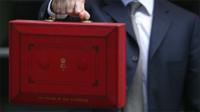A Labour government would abolish the non-domicile rule that allows some wealthy UK residents to limit the tax paid on earnings outside the country.
Ed Miliband said the non-dom rules were "indefensible" in the 21st Century and made Britain "an offshore tax haven".
Shadow Chancellor Ed Balls said on Wednesday the move could raise "hundreds of millions of pounds".
But as recently as January, he said it "would end up costing Britain money" because people would leave the country.
The BBC's assistant political editor Norman Smith said the comments, in a BBC interview ahead of the election campaign, appeared to contradict what he and his leader were saying now about the party's most significant announcement of the campaign so far.
And Chancellor George Osborne said they were an example of the "economic confusion" that would result from a Labour government.
In other election news:
- The Conservatives are pledging resits for pupils with poor Sats tests results at the end of primary school
- In a leaders debate in Scotland, SNP leader Nicola Sturgeon said she would work with Labour to keep David Cameron out of power
- One hundred young voters grilled representatives of the main parties for BBC Radio 1 Newsbeat
- 140 senior doctors sign a letter in the Guardian suggesting the NHS is "withering away" and privatisation is threatening services
- The Lib Dems will pledge a £100m prize fund for car makers to create low-emission vehicles as Miriam Gonzalez Durantez, Nick Clegg's wife, is set to join the campaign trail
- UKIP leader Nigel Farage challenged former Labour PM Tony Blair to a debate "any night between now and the election"
- The English Democrats to launch their election campaign
Non-doms are defined as British residents who pay tax on their UK earnings but whose permanent home is deemed to be outside the UK and therefore do not have to pay UK tax on foreign income as long as they do not transfer it to the UK - they pay a charge of at least £30,000 instead of paying tax as a UK resident.
Famous examples reportedly include Chelsea owner Roman Abramovich, while former Conservative deputy chairman Lord Ashcroft gave up the status in 2010 to keep his place in the House of Lords after a change of law.
Some Labour supporters including businessman Sir Gulam Noon also had non-dom status in the past.

Analysis by political editor Nick Robinson

Whose side are you on? It is one of the most powerful questions in politics and Ed Miliband believes it is the key to seeing him installed in Downing Street.
That's why Labour is targeting the so-called non-doms today. They're very rich, often foreign and enjoy a lifestyle that makes them resented by anyone who's struggled to make ends meet in recent years.
That is, incidentally, the same reason George Osborne targeted them to pay more when he was in opposition and increased the annual tax charge some pay in his last Budget.
Let's be clear though, these people are not tax dodgers. They pay tax on their UK earnings plus an annual charge of £30,000 or more to have a totally legal tax status that Gordon Brown as well as George Osborne decided to keep as they were advised they risked losing more in tax by scrapping it than keeping it.
Read Nick's full blog

In his Autumn Statement in December, Chancellor George Osborne announced a new £90,000 charge for people who are non-domiciled in the UK for tax purposes but have lived there for 17 of the past 20 years.
The previous Labour government introduced a £30,000 charge for people resident in the UK for seven of the previous 10 years but who were non-domiciled for tax purposes.
Under Labour's proposals, no new people will be able to claim non-dom status after April 2016 while existing non-doms to whom the rules have applied for a long time would have a "short period" - likely to be five years - to adjust their tax affairs.
Temporary exemptions would be put in place for students and foreign workers seconded to the UK for a short period of time, in consultation with business and universities.
Policy guide: Taxation
This election issue includes income tax and national insurance levies and business taxes.
In a speech at the University of Warwick, Mr Miliband said non-dom status was an "arcane 200-year rule", allowing a "few people at the top" to "operate under different rules".
He said: "There are people who live here in Britain like you and me, work here in Britain like you and me, are permanently settled here in Britain, like you and me, were brought up here, but just aren't required to pay taxes like you and me."

What is non-domicile status?

- UK residents normally pay UK tax on all their income, whether it is from the UK or abroad, but there are special rules for UK residents whose permanent home or "domicile" is abroad
- The rules can be traced back to the early 19th Century when British nationals working across the Empire maintained the UK as their "domicile of origin" for legal and financial reasons
- So-called non-doms do not pay UK tax on foreign income or sales of overseas properties or shares held abroad unless repatriated to UK
- A domicile is generally deemed to be the country which an individual's father considered to be his permanent home when the child was born. A domicile can change when a person's circumstances alter
- To prove their status, non-doms have to provide evidence about their background, lifestyle and future intentions, such as where they own property or intend to be buried
- Non-doms who bring foreign income to the UK must pay income tax, which can be partly reclaimed, and pay an annual charge ranging from £30,000 to £90,000 to avoid income outside the UK being taxed

"I don't blame people for these individuals taking advantage of non-dom status but these are the rules and they are playing by the rules."
Ensuring that everyone paid the maximum amount of tax in the UK was a "British principle": "It isn't fair, it isn't just and it holds people back and we will stop it. The next Labour government will abolish the non-dom rule."
In a series of media interviews on Wednesday, Mr Balls endorsed the proposed Labour changes, saying the clampdown could raise at least "hundreds of millions of pounds" and rejected claims it would lead to an exodus of businessmen.
"When we introduced tougher rules in 2008, people said people would leave the country," he told Radio 4's Today programme. "That isn't what has happened."
But in a BBC interview in January, Mr Balls said he would be "tougher" on non-doms but appeared to cast doubt on axing the tax exemptions as a whole.
He told BBC Radio Leeds: "If you abolish the whole status, then probably it ends up costing Britain money because there will be some people who then leave the country."
Asked about Mr Balls' comments, Mr Miliband said Labour "had found a way of doing this which is actually going to raise money", citing independent assessments.
'Small print'
The plans won the backing of businessman Duncan Bannatyne, who last week signed a letter backing the Conservatives' economic approach.
On Twitter, Mr Bannatyne said: "This gets my vote I never thought any party would have courage to do this."
But Chancellor George Osborne said the details of Labour's policy suggested they would not abolish non-dom status.
"Labour's policy is a total shambles and it has unravelled today," he said. "You have Ed Balls admitting it will cost Britain money and then when you look at the small print it turns out the majority of non-dons won't be affected so the headlines are misleading."
The Conservatives said they had taken the "right approach" in increasing the annual levy on non-doms and would continue to tackle abuse of the existing rules in the next Parliament through a £5bn crackdown on tax evasion and avoidance.
The Liberal Democrats have also pledged to increase non-dom charges and reform eligibility criteria, saying this could raise an extra £130m while the Green Party said the changes "could not come a moment too soon".
Leader Nick Clegg said "the wheels are coming off" Labour's announcement and "in pursuing a headline they forgot that we must remain an open economy but of course not an economy that is open to abuse".
UKIP gave the plans a cautious welcome, its leader Nigel Farage saying: "I've felt for some time we are selling ourselves too cheap."
Subscribe to the BBC Election 2015 newsletter to get a round-up of the day's campaign news sent to your inbox every weekday afternoon.
Anda sedang membaca artikel tentang
Labour would scrap 'non-dom' status
Dengan url
http://beritaberbagiceria.blogspot.com/2015/04/labour-would-scrap-non-dom-status.html
Anda boleh menyebar luaskannya atau mengcopy paste-nya
Labour would scrap 'non-dom' status
namun jangan lupa untuk meletakkan link
Labour would scrap 'non-dom' status
sebagai sumbernya
0 komentar:
Posting Komentar